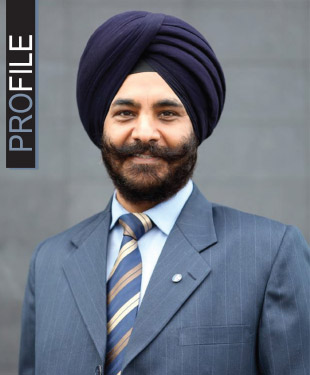By Jessie Kaur Lee hail
 You hear him on South Asian radio, watch him on Joy TV, and see him at numerous community events. But, what is the backstory of Harpreet Singh?
You hear him on South Asian radio, watch him on Joy TV, and see him at numerous community events. But, what is the backstory of Harpreet Singh?
Born in 1968, in India, Mr. Singh went to a boarding school in India. With his father in the military, Mr. Singh learned discipline at an early age. His father was the source of his inspiration. His fondest memory of military life was at the age of four or five when his father was in the Battalion and during a visit by the General. As a young boy, he was driven to school in a car regally decked out with flags. While he revelled in the experience, he knew early on that a military life was not for him.
While he did not follow his father’s footsteps, discipline became his mantra. His father’s words stayed in his heart and mind: “Discipline is what builds the name and valour of the military—it is what separates the rice from the chaff.”
In 1991, Mr. Singh graduated with a Bachelor of Journalism degree, and in 1992 with a Masters in Political Science. In 1992, he became the youngest journalist for the Hindustan Times that boasts a readership of 2.6 million. He applied for the job, was successful, and worked under a mentor who was a no-nonsense guy.
He, like Mr. Singh’s father, instilled lessons of loyalty, creating boundaries, fairness, impeccable ethics by not accepting gifts or pampering, being respectful, and taking pride over the power of the pen. “Avinash Singh was not impressed by my degrees. He taught me the importance of having a practical, ethically relevant approach. He mentored me to reach deep, and when putting an idea across, never overthink it. The goal was always to get the truth out and at times that created issues. He told me to ensure I kept impeccable ethics and not be swayed with accepting gifts.”
Mr. Singh’s father was apprehensive at first about his son’s journalistic endeavour. Soon enough, he realized that his son was carrying on a strong sense of civic responsibility — which is the biggest common denominator between military life and journalism.
“Journalism was a new field,” Mr. Singh recalled. “At first, he did not understand the draw until he saw me covering pressing news about what was happening in India, especially when it involved terrorism. I was also covering the human interest side of the issues, and he understood and was proud of me.”
In 1993, Mr. Singh married his wife, Sandeep. She has been a supportive partner all these years. “She’s my rock and we couldn’t have gotten to where we are today without our appreciation and respect for each another.”
During that same year, Mr. Singh left his print journalism job for ANI-digital. Despite television’s infancy in India, Singh’s journalism with ANI was capricious, instinctive, and never dull. He became a prolific chronicler of how terrorists infiltrated the daily lives of villagers and city dwellers. The stuff that Western writers often find difficult to access, let alone comprehend in their full depth and complexity. He was one of a coterie of journalists who had the skills, charm, moxie, and an impressive Rolodex to not only report on India’s human interest stories but to inhabit them. Thus, he became a stringer for BBC, Time Magazine, Voice of America, Reuters, UK’s Daily Telegraph, New York Times, and Washington Post.
The absolute truth was the core of his journalism. The power and poignancy of his reports came from simply going for the story,—no more, no less. Even the dark, unsightly parts were kept intact. He stayed honest, without fear of alienating an audience or the current political party in power. This tenacity was born out of his personal ethos to live life to the fullest and take every opportunity life presents. For example, to celebrate the birth of their first son in 1994, he went with friends on a motorcycle trip to Khardungla Pass, the highest and most treacherous motorable road in Jammu and Kashmir.
His journalism career was far from perfect. There were a few hiccups, but he did not play favourites and was not swayed by bribes. Mr. Singh’s ardent focus on ethical journalism left him with opponents.
“Day-to-day, the work can be trying. You put in so much effort, and then you realize that you have only moved the bar two inches when it feels like it should have moved two feet or two miles. There are certainly rewarding moments in this profession when you can see that your efforts have led to a positive outcome based on being ethical, and your work has helped people.”
In 2000, Mr. Singh joined digital ZeeTV. While his medium for journalism may have changed, his focus for championing peoples’ stories did not. “I started out this career very idealistic and then nearly ten years later, I was still hopeful, but much more realistic about what could be achieved.”
For him, the media is designed to be adversarial because it is supposed to serve as a scrutinizing check on the claims of those in power, not serve as worshipful, propagandistic amplifiers of those claims. But, ample ink has spilled over debating that of India’s media is biased in favour of the current government. Disappointedly, the overwhelming, driving bias of India’s media is subservience to power, whoever happens to be wielding it. What makes this most ironic, and most destructive, is that this function is the exact antithesis of what media claim they perform.
“Take a close, hard look at today’s society. There is a fall in standards of virtues, values, discipline, family ties, loyalty, sincerity — everything. Everyone wants to take short cuts to achieve money and success. Everybody wants ‘quick money’ and ‘immediate luxuries’. My father’s military ethos influenced my self-discipline, resilience, teamwork and leadership.”
In 2002, Mr. Singh, his wife, and two sons immigrated to Canada. The idea was conceived on a whim the year previous when he was helping a friend apply for immigration. Settling in Canada was a challenge. Journalism had changed dramatically, and Canadian media outlets like the Vancouver Sun required experience in Canadian media to be considered. However, Mr. Singh’s tenacity for journalism landed him a radio host position at Radio Punjab and then Radio India until 2012. “The experience was a new challenge. Radio was not big in India. I remember my biggest challenge was my Punjabi and Hindi being out of practice, and callers requesting that I speak less English and more Punjabi.”
During that first year, he also accepted a role at Omni TV, where he provided daily news coverage for ten months. “While the job was exciting from a journalism standpoint, the hours were long. That time, our two sons were very young. Sandeep and I had agreed early in our marriage that we would be raising our sons together, be always available for them and be good role models for them.”
He then pursued real estate while his wife owns an interior design firm. “Journalism is a passion, but I have a family to raise, and real estate provides that opportunity.” The husband and wife team worked on projects together. Mr. Singh’s sons are high achievers. Both are doing well in academia, sports, music, religious endeavours, civic engagement, and community work. The eldest is taking Medicine at McGill, focusing to be a part of Doctors without Borders. Their younger son, a pianist and debate champion, is currently in high school.
Since 2012, Mr. Singh has been on Red FM Radio and daily television show ‘The Harpreet Singh Show’ on Joy TV. However, he is now throwing his hat into the political ring as a Federal Conservative Party candidate for the Surrey-Newton riding.
The jobs of journalist and politician overlap—both are in the business of digging into and disseminating information, of explaining, of leading, and of influence. Both roles represent the people.
During one of our interviews, it was remarkable to see him mobilize resources to find a solution. Off the record, he was sharing a story about a group of refugees who were temporarily living in a church in Surrey. When someone referred to a food pickup community group, there was a flurry of calls to set things in motion. A pickup/drop-off schedule every Sunday with a retail chain and the community group was solidified, within minutes. It seems apparent what his strategy will be if he wins the 2015 election.
Mr. Singh wants to represent his local community fairly. He is not into the gimmicks and tricks of political campaigns. He just wants to do what has worked for him thus far— engaging with people—especially with the youth. He plans to tackle issues like domestic abuse, gangs, and elder concerns.
People can play a very important role in the causes they are passionate about. With dialog and engagement of the citizens of his riding and help find solutions to the issues in Surrey-Newton.
“I want all voices to be heard. We can bring about a change. I am a common man, an immigrant. I know the issues in this riding. And I want to mobilize resources to find solutions.”
Regrets? He has none. “I have been blessed with a great family and many opportunities. I believe that life unfolds in proportion to one’s courage. One must be willing to take chances and step into new challenges, to learn, to give back, and to become a better person—exactly what I intend to continue.”



